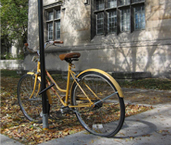Big Problems Courses
BPRO 21500. What Is Civic Knowledge? 100 Units.
What is civic knowledge? Although civic rights and duties are supposedly universal to all citizens in a “democratic” nation, their implementation often depends on the strength of community connections and the circulation of knowledge across racial, class, and social boundaries. Focusing on the city of Chicago, we ask how citizens (in their roles as citizens) forge communities, make urban plans, and participate in civic affairs. How does the city construct the public spheres of its residents? Are the social practices of Chicagoans truly “democratic?” Could they be? What does “Chicago” stand for, as a political and cultural symbol? For both Chicagoans and their representatives, the circulation of knowledge depends not only on conventional media but also on how the city is constructed and managed through digital media.
Instructor(s): R. Schultz, M. Browning. Terms Offered: Not Offered 2012-2013; Will be offered 2013-2014
Prerequisite(s): Third- or fourth-year standing
BPRO 22200. Boundaries, Modules, and Levels. 100 Units.
This course investigates conceptual problems arising in the attempt to analyze the structure of complex systems in a variety of biological, psychological, social, and technological contexts, and how the answers may vary with how the boundaries are drawn. We confront descriptive, critical, and normative puzzles arising from questions such as the following: Is a society just a collection of people, an organized collection of people, or something more? Can a corporation have rights and responsibilities? Can groups have identities? Why are minds in the head, or are they? And are genes the bearers of heredity?
Instructor(s): W. Wimsatt, Staff Terms Offered: Not Offered 2012-2013
Prerequisite(s): Third- or fourth-year standing
BPRO 22300. Empire. 100 Units.
Students in this course read a variety of texts (e.g., writings of Thucydides, Vergil, and Forster; documents from the caliphate of Andalusia; current articles). By viewing their own experiences in the light of Arab, British, Greek, and Roman empires, students reflect on America’s role in the cultures and countries of the twenty-first century. Economics, language, culture, ecology, and social ethics may provide the lenses through which students view and review their experiences.
Instructor(s): Staff Terms Offered: Not Offered 2012-2013
Prerequisite(s): Third- or fourth-year standing. Completion of the general education requirement in civilization studies through a College-sponsored study abroad program.
BPRO 22400. The Ugly American Comes Home. 100 Units.
The aims of this course are to interrogate not only the experience of studying abroad, but also the condition of coming “home” and facing a range of needs to assimilate and articulate your experience. We address being abroad and afterward through a range of reading materials, including travel writings, philosophies of education, and considerations of narrative and perception. Writing assignments will explicitly address the challenge of integrating study abroad with other forms of knowledge and experience that characterize collegiate education.
Instructor(s): M. Merritt, Staff Terms Offered: Spring
Prerequisite(s): Third- or fourth-year standing; completion of a study abroad program (University of Chicago program, other institution’s program, or self- structured program).
Equivalent Course(s): INST 22400
BPRO 22600. Autonomy and Medical Paternalism. 100 Units.
This course does not meet requirements for the biological sciences major. This course is an in-depth analysis of what we mean by autonomy and how that meaning might be changed in a medical context. In particular, we focus on the potential compromises created by serious illness in a person with decision-making capacity and the peculiar transformations in the meaning of autonomy created by advance directives and substituted judgment.
Instructor(s): D. Brudney, J. Lantos Terms Offered: Not Offered 2012-2013
Prerequisite(s): Third- or fourth-year standing
BPRO 22610. Medical Ethics: Who Decides and on What Basis? 100 Units.
Decisions about medical treatment take place in the context of changing health care systems, changing ideas about rights and obligations, and among doctors and patients who have diverse religious and cultural backgrounds. By means of historical, philosophical, and medical readings, this course examines such issues as paternalism, autonomy, the commodification of the body, and the enhancement of mental and/or physical characteristics.
Instructor(s): D. Brudney, A. Dudley Goldblatt, L. Ross Terms Offered: Winter
Prerequisite(s): Third- or fourth-year standing
Note(s): This course does not meet requirements for the biological science major.
Equivalent Course(s): BIOS 29313,HIPS 21911,PHIL 21610
BPRO 23000. Cosmos and Conscience: Looking for Ourselves Elsewhere. 100 Units.
Science and religion are two ways, among many others, that people can seek to know about reality: how do we construct ordered pictures of the whole—cosmos or civilization—and how do we relate to them in terms of action? How do we know what we do not know, and what does that kind of “knowledge” mean for the orientation and direction of human existence? How would cultural biases be affected by knowing that there are others “out there” in the universe, should we discover them? From various perspectives, this course addresses these questions of the origins, structures, and ends of reality as we look for ourselves—seek understanding of the human condition—in the cosmos but also in complex religious and cultural traditions. Whereas in our popular culture, science is often identified with the realm of knowledge and religion is simply “belief” or “practice,” the course also seeks to trace the rational limits of science and the rational force of religion with respect to the ethical problem of the right and good conduct of human life.
Instructor(s): W. Schweiker, D. York Terms Offered: Autumn
Prerequisite(s): Third- or fourth-year standing
Equivalent Course(s): ASTR 23000,RLST 23603
BPRO 23400. Is Development Sustainable? 100 Units.
This discussion course grapples with the “big problem” of sustainable development. We analyze problematical issues underlying population growth, resource use, environmental transformation, and the plight of developing nations through a consideration of economic, political, scientific, and cultural institutions and processes.
Instructor(s): A. Kolata, Staff Terms Offered: Not Offered 2012-13; Will be offered 2013-2014
Prerequisite(s): Third- or fourth-year standing required
Note(s): Background in environmental issues not required
BPRO 23500. The Organization of Knowledge. 100 Units.
This course explores several structures of knowledge that students may have encountered in their core and specialized education, with the goal of enabling students to identify and explore the implications of these different structures. We ask whether all knowledge is relative, and if so, to what? When things are structured differently, does that mean that knowledge is lost? Or are there several diverse ways of structuring knowledge, each of which may be viable? We read a wide range of classical and modern thinkers in various disciplines.
Instructor(s): W. Sterner, Staff Terms Offered: Not Offered 2012-2013
Prerequisite(s): Third- or fourth-year standing
BPRO 23600. Social Context, Biology, and Health. 100 Units.
We take for granted our relationships with other people as fundamental. Yet when these connections are absent or disrupted, our minds and biology are likewise disrupted. Epidemiological studies have now clearly established a relationship between social isolation and both mental and physical health. This course adopts an integrative interdisciplinary approach that spans the biological to sociological levels of analysis to explore the interactions involved and possible mechanisms by which the social world gets under the skin to affect the mind, brain, biology, and health.
Instructor(s): J. Cacioppo, M. McClintock, L. Waite Terms Offered: Not Offered 2012-2013
Prerequisite(s): Third- or fourth-year standing
BPRO 23760. The Social Brain: Social Isolation and Loneliness. 100 Units.
The past two decades have witnessed a remarkable rise in the number of investigations published on the social brain. The discoveries conveyed by the titles of many of these reports (e.g., the neural basis of love, altruism, morality, generosity, trust) have piqued the interest of young investigators, funding agencies, the media, and laypeople alike. Such attention is a double-edged sword, however, as errors are exaggerated in importance, and oversimplifications create false expectations and, ultimately, disillusionment in what the field can contribute. It is, of course, one thing to assume that neural processes underlie all psychological phenomenon, it is another to claim that a given brain region is the biological instantiation of complex psychological functions like the self, empathy or loneliness. The purpose of this course is to examine opportunities and challenges in this field primarily through research on two of the most important topics in the field: social isolation and empathy.
Instructor(s): J. Cacioppo, L. Hawkley Terms Offered: Spring
Prerequisite(s): Third- or fourth-year standing
Note(s): This course does not meet the requirements for the biological sciences major.
Equivalent Course(s): BIOS 29324,PSYC 23760
BPRO 23900. Biological and Cultural Evolution. 100 Units.
This course draws on readings in and case studies of language evolution, biological evolution, cognitive development and scaffolding, processes of socialization and formation of groups and institutions, and the history and philosophy of science and technology. We seek primarily to elaborate theory to understand and model processes of cultural evolution, while exploring analogies, differences, and relations to biological evolution. This has been a highly contentious area, and we examine why. We seek to evaluate what such a theory could reasonably cover and what it cannot.
Instructor(s): W. Wimsatt, S. Mufwene Terms Offered: Spring
Prerequisite(s): Third- or fourth-year standing or consent of instructor required; core background in evolution and genetics strongly recommended.
Note(s): This course does not meet requirements for the biological sciences major.
Equivalent Course(s): BIOS 29286,CHSS 37900,HIPS 23900,LING 11100,NCDV 27400,PHIL 22500,PHIL 32500
BPRO 24100. Science and Religion. 100 Units.
In this course, we explore some aspects of the relations between science and religion in Western culture (e.g., Christian, Jewish, Islamic). Questions include: What are science and religion? Are they competing intellectual systems for making sense of the world? What are social institutions? Can they be in conflict with one another? Can they support one another? Each of the instructors treats these questions by examining certain historical episodes and texts to add different perspectives to the material.
Instructor(s): R. Perlman, Staff Terms Offered: Not Offered 2012-2013
Prerequisite(s): Third- or fourth-year standing
BPRO 24150. Romantic Love: Cultural, Philosophical, and Psychological Aspects. 100 Units.
This double-credit course combines humanistic and social scientific disciplines to examine the phenomenon of romantic love—a “big problem” in practical, theoretical, and cultural senses. The course starts by comparing representations of romantic love experiences in visual, musical and literary arts and myths. After exploring what may be specific to this form of love, we address two further issues: the role and sources of non-rational experience in romantic love, and the role of romantic love in modern marriage. Illumination of these topics is sought through the discussion of humanistic and social scientific texts and cinematic presentations.
Instructor(s): D. Orlinsky, Staff Terms Offered: Not Offered 2012-2013
Prerequisite(s): Third- or fourth-year standing
Note(s): The class meets for six hours a week.
BPRO 24160. Love and Tragedy in Tolstoy’s Anna Karenina. 100 Units.
Tolstoy’s great novel Anna Karenina may be the finest and most compelling depiction in literature of the diverse aspects and outcomes of romantic love. Combining humanistic and social scientific perspectives, this course undertakes an intensive study of the novel to examine the joys and sorrows of romantic love, and the successes and tragedies that follow from it, as well as the aesthetic achievement of the novel as a major work of art. Resources for understanding the development of the novel’s characters and the fate of their relationships are drawn from Freud’s Introductory Lectures on Psychoanalysis and other works. Bases for a critical appreciation of the novel are drawn from Aristotle’s Poetics and Nietzsche’s The Birth of Tragedy.
Instructor(s): D. Orlinsky, Staff Terms Offered: Not Offered 2012-2013
Prerequisite(s): Third- or fourth-year standing
BPRO 24200. Psychoneuroimmunology: Links between the Nervous and Immune Systems. 100 Units.
This course covers all aspects of neuroimmunoendocrinology at the molecular, cellular, and organismal and social levels.
Instructor(s): M. McClintock, J. Quintans Terms Offered: Not Offered 2012-2013
Prerequisite(s): Third- or fourth-year standing, and BIOS 20180s or 20190s
Note(s): This course meets requirements for the biological sciences major.
BPRO 24300. Globalization and Neo-Liberalism. 100 Units.
Developments over the past decade have led a number of former leading enthusiasts of globalization to raise basic criticisms of the neo-liberal paradigm. In doing this, they have echoed and drawn attention to the results of economists and historians whose work undercuts the basic premises of neo-liberalism. This course explicates a varied collection of this work, viewed as a critique and alternative to neo-liberalism, by economic historians (e.g., Hobsbawn, Williams, Arrighi, Polanyi) and economists (e.g., Palley, Taylor, Stretton, Marglin, Eatwell, MacEwan, Blecker, Brenner).
Instructor(s): M. Rothenberg, Staff Terms Offered: Not Offered 2012-2013
Prerequisite(s): Third- or fourth-year standing
BPRO 24400. Concepts of the Self from Antiquity to the Present. 100 Units.
This seminar explores the evolution of ideas about the nature and formation of selfhood from classical antiquity to the present. Along the way, we look at Greek tragedy, Stoic philosophy, early Christian texts, and the conceptual models of selfhood and self-understanding behind Descartes, Kant, Freud, Foucault, and others. Students should be prepared to deal extensively with scholarship on self, ethics, and community across the fields of philosophy, anthropology, psychology, and social history.
Instructor(s): S. Bartsch, J. Goldstein Terms Offered: Not Offered 2012-2013
Prerequisite(s): Third- or fourth-year standing
BPRO 24500. Language and Globalization. 100 Units.
Distinguishing myths from facts, this course articulates the different meanings of globalization, anchors them in a long history of socioeconomic colonization, and highlights the specific ways in which the phenomena it names have affected the structures and vitalities of languages around the world. We learn about the dynamics of population contact and their impact on the evolution of languages.
Instructor(s): S. Mufwene, W. Wimsatt Terms Offered: Not Offered 2012-2013
Prerequisite(s): Third- or fourth-year standing
BPRO 24600. Moments in Atheism. 100 Units.
Atheism is as old as religion. As religion and its place in society have evolved throughout history, so has the standing and philosophical justification for non-belief. This course examines the intellectual and cultural history of atheism in Western thought from antiquity to the present. We are concerned with the evolution of arguments for a non-religious worldview, as well as with the attitude of society toward atheism and atheists.
Instructor(s): S. Bartch, Staff Terms Offered: Not Offered 2012-2013
Prerequisite(s): Third- or fourth-year standing
BPRO 24700. From Neo-Liberalism to Neo-Imperialism. 100 Units.
This course examines the thesis advanced by a number of recent thinkers on the organic ties between neo-liberal doctrine and the rise of a new imperialism. In False Dawn, noted conservative political theorist John Gray gives a critique of the global free market. In Capital Resurgent: Roots of the Neoliberal Revolution, two important left critics, economists Gerard Dumenil and Dominique Levy, investigate the economic roots of neo-liberalism. Finally, in reading two recent works by the economic geographer David Harvey (A Brief History of Neo-Liberalism and The New Imperialism) we consider in depth the link between neo-liberalism and imperialism.
Instructor(s): M. Rothenberg, Staff Terms Offered: Not Offered 2012-2013
Prerequisite(s): Third- or fourth-year standing
BPRO 24800. The Complex Problem of World Hunger. 100 Units.
Few of our policymakers are experts in economics, agronomy, food science, and molecular biology, yet all of these disciplines are essential for developing strategies to end world hunger. Choosing one country as a test case, we look at the history, politics, governmental structure, population demographics, and agricultural challenges. We then study the theory of world markets, global trade, and microeconomics of developing nations, as well as the promise and limitation of traditional breeding and biotechnology.
Instructor(s): J. Malamy, Staff Terms Offered: Not Offered 2012-2013
Prerequisite(s): Third- or fourth-year standing
BPRO 24900. Biology and Sociology of AIDS. 100 Units.
This interdisciplinary course deals with current issues of the AIDS epidemic. Readings are based primarily on AIDS Update 2011.
Instructor(s): H. Pollack, J. Schneider Terms Offered: Winter
Prerequisite(s): Third- or fourth-year standing
Note(s): This course does not meet requirements for the biological sciences major.
Equivalent Course(s): BIOS 02490,SSAD 65100
BPRO 25000. Images of Time: Japanese History through Film. 100 Units.
Focusing attention on the emerging nexus between audio-visual media and historical studies, this course deals with theories of time, history, and representation while making those ideas and problems concrete through a study of the way in which history in Japan has been mediated by the cinema. A close reading of a wide range of films produced in and about Japan in tandem with primary and secondary materials on theories of time, images, and national history highlights the historicity and history of both film and Japan. All work in English.
Instructor(s): J. Ketelaar, Staff Terms Offered: Not Offered 2012-2013
Prerequisite(s): Third- or fourth-year standing required; knowledge of Japanese not required.
BPRO 25100. Evolutionary Theory and Its Role in the Human Sciences. 100 Units.
The course’s aim is two-fold: (1) an examination of the origins and development of Darwin’s theory from the early nineteenth century to the present; and (2) a selective investigation of the ways various disciplines of the human sciences (i.e., sociology, psychology, anthropology, ethics, politics, economics) have used evolutionary ideas.
Instructor(s): R. Richards, Staff Terms Offered: Not Offered 2012-2013
Prerequisite(s): Third- or fourth-year standing
BPRO 25200. Body and Soul: Approaches to Prayer. 100 Units.
Why do we pray? Why do we experience prayer practice as reaching out towards an intentional being whom we cannot (except in representation) touch, see, or hear? This course approaches an answer to that question by looking at the way we pray, particularly in a Christian context. What kinds of bodily engagement do we find in prayer; what impact might prayer practice have upon our bodies; what bodily features of prayer might help to explain why its practice has been so compelling to so many for so many years?
Instructor(s): Staff Terms Offered: Not Offered 2012-2013
Prerequisite(s): Third- or fourth-year standing
BPRO 25300. Utopias. 100 Units.
This course surveys significant moments in utopian practice, choosing case studies from among Plato’s Republic, Sir Thomas More’s Utopia, national experiments, utopian communities, socialism, technophily, new social movements, radical conservatism, and fundamentalisms. We focus on literature and art, (e.g., music, painting, architecture and urbanism, film and digital media).
Instructor(s): L. Berlant, R. Zorach Terms Offered: Not Offered 2012-2013
Prerequisite(s): Third- or fourth-year standing
BPRO 26050. Memory, Commemoration, and Mourning. 100 Units.
This course focuses on the manner in which we make use of the past, the personal past, the collective past, and the place of social and historical change in retelling and rewriting life-history and history. The course begins with a discussion of memory, conceptions of the personal and historic past, and such related issues as nostalgia, mourning, and the significance of commemoration in monument and ritual. These issues are explored in a number of topics such as twentieth-century war memorials, high school and college reunions, and the Holocaust and its representation in contemporary European society.
Instructor(s): B. Cohler, Staff Terms Offered: Not Offered 2012-2013
Prerequisite(s): Third- or fourth-year standing
BPRO 26101. On Love: Classical and Modern Perspectives. 100 Units.
The nature and function of love in human life have been a major concern of Western thought from classical antiquity to the present. This course examines and compares views of love from selective perspectives in classical philosophy (Plato on eros, Aristotle on philia) and modern personality psychology (Freud on libidinal development, Bowlby on attachment and care-giving). Authors will be studied in their own right and as they shed light on the love relationships depicted in Tolstoy’s novel Anna Karenina. Classes will include lectures and discussion periods.
Instructor(s): D. Orlinsky, Staff Terms Offered: Not Offered 2012-2013
Prerequisite(s): Third- or fourth-year standing
BPRO 26600. Antonioni’s Films: Reality and Ambiguity. 100 Units.
In this in-depth study of several Antonioni films, our eye is on understanding his view of reality and the elements of ambiguity that pervade all of his films. Together, as a film scholar and physicist, we bring out these aspects of his work together with his unique cinematic contributions. This course introduces students to this poet of the cinema and the relevance of Antonioni’s themes to their own studies and their own lives.
Instructor(s): Y. Tsivian, B. Winstein Terms Offered: Not Offered 2012-2013
Prerequisite(s): Third- or fourth-year standing
BPRO 27000. Perspectives on Imaging. 100 Units.
Taught by an imaging scientist and an art historian, this course explores scientific, artistic, and cultural aspects of imaging from the earliest attempts to enhance and capture visual stimuli through the emergence of virtual reality systems in the late twentieth century. Topics include the development of early optical instruments (e.g., microscopes, telescopes), the invention of linear perspective, the discovery of means to visualize the invisible within the body, and the recent emergence of new media. We also consider the problem of instrumentally mediated seeing in the arts and sciences and its social implications for our image-saturated contemporary world.
Instructor(s): P. La Riviere, Staff Terms Offered: Not Offered 2012-2013
Prerequisite(s): Third- or fourth-year standing
Note(s): This course does not meet requirements for the biological sciences major.
BPRO 27600. Creation and Creativity. 100 Units.
This seminar explores several creation stories from anthropological, literary, philosophical, and psychological perspectives. We compare the accounts of the beginning in Genesis, Hesiod’s Theogony, Ovid’s Metamorphoses, Bhagavad Gita, the Maya’s Popol Vuh, and other sources, including Native American ones. We explore the ways cosmic creation has been imagined in world culture. We also delineate human literary creativity and ask about the relationship between individual creativity and the cultural myths of creation. We consider at least one modern theory of the beginning of the universe.
Instructor(s): P. Friedrich, Staff Terms Offered: Not Offered 2012-2013
Prerequisite(s): Third- or fourth-year standing
BPRO 28000. Terror, Religion, and Aesthetics. 100 Units.
Through our contemporary experiences of terrorist acts, we apprehend the no-citizens’ land of life without a social contract, of the violent “state of nature” among people. In varied genres (e.g., poems, plays, novels, memoirs, essays), we engage with the transformative powers of diverse aesthetics (e.g., catharsis, the sublime, theatre of cruelty, realism, fable, satire) and of religious faiths (e.g., deism, Hinduism, Judaism, Islam, Sufism, Buddhism) to counteract terror and redeploy our civil status in society.
Instructor(s): M. Browning, Staff Terms Offered: Not Offered 2012-2013
Prerequisite(s): Third- or fourth-year standing
BPRO 28100. What Is Enlightenment? 100 Units.
What is enlightenment? How does one become enlightened, and who is enlightened? In Euro-American civilization, the eighteenth-century Age of Enlightenment championed the powers of human reason against religion and superstition to achieve scientific progress. Buddhism in the nineteenth century was represented by the heirs of Enlightenment as a religion for the Enlightenment to the point of not being a religion at all. Both traditions offer pathways to freedom (or liberation?) that draw on our rational capabilities, and both sponsor the production of knowledge that re-visions our place in the world. But they seem to be opposed: how could reason reject “religious” beliefs but also take part in “religious” traditions that aim to bring certain kinds of persons into being? We compare the mental models, discourses, methods of analysis, world-images, and practices of these traditions of enlightenment to assess the kinds of disciplines that their theoreticians and practitioners acquire and use.
Instructor(s): M. Browning, Staff Terms Offered: Not Offered 2012-2013
Prerequisite(s): Third- or fourth-year standing
BPRO 28500. Sex and Ethics. 100 Units.
Sex is a big problem. How do we think about sex in proximity to considering the ethics of risk, harm, and the potential for good? Developing an account specifically of an ethics of sex requires thinking about the place of sex and sexual vulnerability in social life with an eye toward understanding what’s good and what might count as abuses, violations, disruptions, or deprivations of specifically good things about sex. In popular discussion, for example, “consent” often demarcates ethically good sex from bad sex. This course inquires whether consent is an adequate metric for sexual ethics; if it is necessary or sufficient; if certain factors (e.g., age, gender, violence) vitiate its normative force; and whether its legal definition conflicts, coheres with, or contributes to its general cultural reception. These issues require us to think about the ways people do, do not, and cannot know what they’re doing in sex, and complicate the aspiration to have an ethics in proximity to sex. This year’s version of the course focuses on political theory/policy/popular scandal in relation to aesthetics and sex theory archives. We talk about sex in proximity to modes of comportment in love, scandal, prostitution, stranger intimacy, political freedom and discipline, impersonality, and experimentality.
Instructor(s): L. Berlant, Staff Terms Offered: Not offered 2012-2013
Prerequisite(s): Third- or fourth-year standing
BPRO 28600. Health Care and the Limits of State Action. 100 Units.
In a time of great human mobility and weakening state frontiers, epidemic disease is able to travel fast and far, mutate in response to treatment, and defy the institutions invented to keep it under control: quarantine, the cordon sanitaire, immunization, and the management of populations. Public health services in many countries find themselves at a loss in dealing with these outbreaks of disease, a deficiency to which NGOs emerge as a response (an imperfect one to be sure). Through a series of readings in anthropology, sociology, ethics, medicine, and political science, we will attempt to reach an understanding of this crisis of both epidemiological technique and state legitimacy, and to sketch out options.
Instructor(s): E. Lyon, H. Saussy Terms Offered: Autumn
Prerequisite(s): Third- or fourth-year standing
Note(s): This course does not meet the requirements for the Biological Sciences major.
Equivalent Course(s): BIOS 29323,CMLT 28900,HMRT 28602
BPRO 28800. The Role of Animals in Modern Society. 100 Units.
The role of animals in American society has evolved as society has evolved, from an agrarian society to an industrial society to a consumer society to a developing animal-protectionist society. In other parts of the world, this evolution has been more rapid than in the United States (Western Europe and the United Kingdom), while in Third World countries, agrarian society is still the norm, and the place of animals remains much more utilitarian. The changes in use of and concern for animals, and expectations of the proper role for animals in society have caused clashes of opinions in multiple fields of human endeavor, complicated by local societal norms. This course addresses the use of animals in society from multiple perspectives. From a science perspective, we would include viewpoints presented by experts in human medicine, veterinary medicine, basic science research, and agriculture. From the liberal arts perspective, we would include discussions from philosophy, history, anthropology, religion, social science, law, and public policy.
Instructor(s): C. Wardrip, B. Theriault Terms Offered: Winter
Prerequisite(s): Third- or fourth-year standing
Note(s): This course does not meet requirements for the biological sciences major.
BPRO 29000. Energy and Energy Policy. 100 Units.
This course shows how scientific constraints affect economic and other policy decisions regarding energy, what energy-based issues confront our society, how we may address them through both policy and scientific study, and how the policy and scientific aspects can and should interact. We address specific technologies and the policy questions associated with each, as well as with more overarching aspects of energy policy that may affect several, perhaps many, technologies.
Instructor(s): S. Berry, G. Tolley Terms Offered: Autumn
Prerequisite(s): Third- or fourth-year standing. For ECON 26800: ECON 26500 and consent of instructor.
Equivalent Course(s): CHSS 37502,ECON 26800,ENST 29000,PBPL 29000,PPHA 39201,PSMS 39000
BPRO 29100. What Do the Genomes Teach Us about Evolution? 100 Units.
The twenty-first century opened with publication of the draft human genome sequence, and there are currently over 3,000 species whose genomes have been sequenced. This rapidly growing database constitutes a test of nineteenth- and twentieth-century theories about evolution and a source of insights for new theories. We discuss what genome sequences have to teach us about the relatedness of living organisms, the diversity of cellular life, mechanisms of genome change over evolutionary time, and the nature of key events in the history of life on earth. The scientific issues are related to the history of evolutionary thought and current public controversies about evolution.
Instructor(s): J. Shapiro, M. Long
Prerequisite(s): Third- or fourth-year standing
Note(s): This course does not meet requirements for the biological sciences major.







